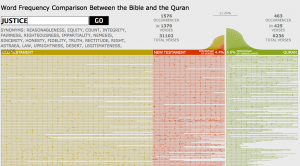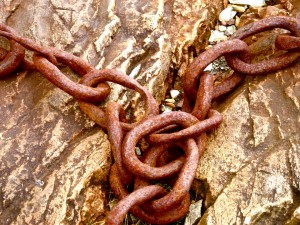Justice

How much water have you used today?
You probably took a shower, used your toilet, brushed your teeth, maybe boiled some for a cup of tea of coffee, not to mention being well on the way to the 64 ounces of water that we’re told to drink every day.
Very quickly the amount of water you’ve used, without even thinking, adds up. Thankfully, water is not a luxury in America, or the developed world in general.
But a new video released by the United Nations Refugee Agency (UNHCR) today paints a stark picture of just how precious and luxurious resource water is in many parts of the world.
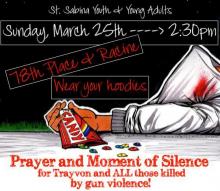
Christians and other people of good faith nationwide stood in solidarity with Trayvon Martin this weekend by wearing hooded sweartshirts — aka "hoodies"— to church.
Monday marks the one-month anniversary of Trayvon's slaying in Sanford, Florida at the hands of neighborhood "watchman" Gregory Zimmerman, who shot and killed the 17-year-old African-American boy in “self defense” for “looking suspicious” while dressed in a hooded sweatshirt.
Trayvon was unarmed, carrying only a package of Skittles, an iced tea and his cell phone.
Last week, people across the nation began wearing hoodies to work, school, and community marches in response to Trayvon's slaying and the injustice of the kind of racial profiling that it would appear directly led to it. On Sunday, many churches took that vision a step further as pastors and congregants donned hoodies and wore them to church for what some congregations called "Hoodie Sunday."
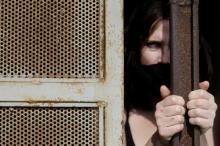
When police from the 115th Precinct raided a brothel a few blocks from Roosevelt Avenue in Queens, N.Y., in January 2011, one of the prostitutes leapt from a second-story window, breaking her leg.
The Korean-born woman, along with others in the apartment, was arrested on charges of prostitution. It was a heartbreaking story, even to JudgeToko Serita, who has heard many of them. “This is the saddest case I’ve seen,” she said.
This desperate act might seem to be an isolated, arbitrary event in the life of a single woman, a misfortune created by a series of bad choices she could have avoided.
But her situation wasn’t simply a result of individual choice; this woman was the product of expansive, organized networks of international crime that enslave women into a life of prostitution, robbing them of all dignity — physical, social, psychological, emotional, spiritual — and even their vocational sense of worth.
“She was so ashamed, she’d rather risk the jump than the public humiliation,” said Stella, the woman’s counselor from RestoreNYC — a four-year-old nonprofit that seeks to help sex-trafficked women in New York City escape and establish new lives. (In order to insure the safety of their clients, Restore staff are identified only by first name.)
 Yes, it's odd, having a rock star here—but maybe it's odder for me than for you. You see, I avoided religious people most of my life. Maybe it had something to do with having a father who was Protestant and a mother who was Catholic in a country where the line between the two was, quite literally, a battle line. Where the line between church and state was… well, a little blurry, and hard to see.
Yes, it's odd, having a rock star here—but maybe it's odder for me than for you. You see, I avoided religious people most of my life. Maybe it had something to do with having a father who was Protestant and a mother who was Catholic in a country where the line between the two was, quite literally, a battle line. Where the line between church and state was… well, a little blurry, and hard to see.
I remember how my mother would bring us to chapel on Sundays… and my father used to wait outside. One of the things that I picked up from my father and my mother was the sense that religion often gets in the way of God.
For me, at least, it got in the way. Seeing what religious people, in the name of God, did to my native land… and in this country, seeing God's second-hand car salesmen on the cable TV channels, offering indulgences for cash… in fact, all over the world, seeing the self-righteousness roll down like a mighty stream from certain corners of the religious establishment…
I must confess, I changed the channel. I wanted my MTV.
Even though I was a believer.
Perhaps because I was a believer.
~ Bono of U2, in his 2006 National Prayer Breakfast keynote address
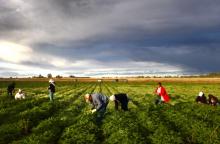
About every five years the Farm Bill addresses a broad set of food and agricultural policy issues. Commodity price supports, farm credit, trade, agricultural conservation, research, rural development, energy, and foreign and domestic food programs were just some of the issues included in the Food, Conservation, and Energy Act of 2008, as the last Farm Bill legislation was officially titled.
The Farm Bill is also known for the broad range of policy stakeholders who work on it, including state organizations, national farm groups, commodity associations, conservation advocates, rural development organizations, and faith-based groups.
But even with its inclusive set of policy issues and actors, the Farm Bill is notable for one issue policymakers and advocates doesn’t touch: People who work on farms.
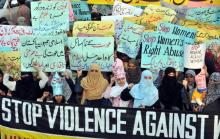
The recent conviction in Canada of Afghani-Canadian parents and son, in the highly-publicized legal case hinging on what has been described broadly as “honor killings,” has exposed the horrifically demented practice to public scrutiny.
Though the three defendants — Mohammad Shafia, his wife and son — denied responsibility for the death of Shafia’s three daughters and first-wife, the Canadian court decided otherwise.
Recordings presented during the trial included wiretaps in which Shafia called his dead daughters “treacherous” and “whores” because they dated boys and wore what Shafia considered to be suggestive clothing. When the verdict was announced, Ontario Superior Judge Robert Maranger determined that the murders of the four women —ages 13, 17, 19 and 52 — were, in fact, motivated by warped (some might say, rightly, “sociopathic”)ideology. As he ruled, Maranger said:
"It is difficult to conceive of a more despicable, more heinous crime. The apparent reason behind these cold-blooded, shameful murders was that the four completely innocent victims offended your completely twisted concept of honor.”
Mohammed Shafia’s distorted concept of honor is one that is shared by far too many around the globe. It says that the murder of women and girls — those ones who don’t play by the family rules — restores the honor the family has been deprived of by virtue of its female members’ behavior.
In 1884, Romney’s great-grandfather, Miles Parker Romney, fled to Mexico from Utah. Miles Parker Romney was a practicing polygamist and he wanted to protect his family from persecution. Mitt Romney’s father was born in Mexico, his family returned to the United States and took up residence in Michigan.
While Romney wouldn’t agree with his ancestor’s practice of polygamy, I am sure he understands his great-grandfather’s desire to do what he thought best for his family. Luckily for Miles Parker Romney, there was a country that allowed his family to settle and try and find a better life.
What is unfortunate is that candidate Romney doesn't seem to have that same kind of empathy for families today who are also in difficult positions.

The legacy of Martin Luther King, Jr., and the reality of climate change are both victims of western culture’s remarkable capacity to accommodate and neutralize that which is most critical of it.
Early in the civil rights movement, Bayard Rustin said to King, “I have a feeling that the Lord had laid his hand upon you. And that is a dangerous, dangerous thing.” Similarly, the FBI once described Martin King as the “most dangerous man in America” – and yet, as Martin Luther King Jr day rolls around again in the United States, we are often presented with a figure that seems more like a cheerleader for the status quo rather than a prophetic challenge to it. Somehow, it seems we have made this dangerous figure very safe.
For instance, in a speech at the Pentagon commemorating King’s legacy, the Defense Department’s general counsel Jeh C. Johnson remarked, “I believe that if Dr King were alive today, he would recognize that we live in a complicated world, and that our nation’s military should not and cannot lay down its arms and leave the American people vulnerable to terrorist attack.”
But to claim that Dr King would be pro-war today is as likely as him being pro-segregation. After all, this is the Dr King who said, “A nation that continues year after year to spend more money on military defence than on programs of social uplift is approaching spiritual death.” And this is the same Dr King who said in his speech on 4 April 1967 (a speech that turned three quarters of American public opinion against him), “To me the relationship of the ministry [of Jesus Christ] to the making of peace is so obvious that I sometimes marvel at those who ask me why I’m speaking against the war.” And this is the same Dr King who said, the night before he was murdered on 4 April 1968, “It is no longer a choice, my friends, between violence and nonviolence. It is either nonviolence or nonexistence.”
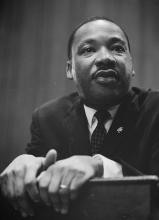
The Rev. Dr. Martin Luther King did not give his life just for Black Americans, but for all Americans. He knew America could be better. He knew the America that was birthed with the hope of “liberty for all” excluded hundreds of thousands of people.
As he said in his famous sermon that is so often referred to as the “I Have a Dream” speech,
In a sense we have come to our nation's capital to cash a check. When the architects of our republic wrote the magnificent words of the Constitution and the Declaration of Independence, they were signing a promissory note to which every American was to fall heir. This note was a promise that all men, yes, black men as well as white men, would be guaranteed the unalienable rights of life, liberty, and the pursuit of happiness....
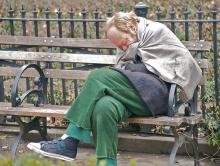
There are times when a story in the news just makes one stop with a righteous indignation.The news I heard today that one in two Americans is now classified as poor makes me angry.
This means half of the people living the richest nation in the world are poor. Is this the American exceptionalism we want?
I am angry because this is a not necessary. I am angry that so many people are suffering, while our elected officials are playing games, unable or unwilling to do what is necessary to promote the general welfare of the nation.
One year of prison costs more than one year at Princeton. Capitalism and social justice. OpEd: The values discussion we're not having. 'One Day's Wages' fights poverty two years on. Government aid helped cut U.S. poverty nearly in half. Religion-friendly democracy and democracy-friendly religion. And Newt Gingrich says God forgave him.

It's a clear sign something's wrong when talks on "free trade" turn an island paradise into an armed camp.
Hawaii is on lockdown this week while the U.S. tries to hammer out a regional trade agreement that's being called "NAFTA for the Pacific." While some mean this as a compliment, Hawaii's faith and labor leaders are lifting their voices against an agreement they believe will put profits for banks and corporations above workers' rights, indigenous culture, and local communities. Those leaders are drawing on the Pacific region's indigenous "Coconut Theology" to provide an alternative vision of the common good.
"Coconut Theology came out of our contextual understanding of the Gospel in the Pacific," said Rev. Piula Alailima, pastor of Wesley Methodist Church in Honolulu and a core leader in the community organizing group Faith Action for Community Equity (FACE). "When we break the body of the coconut and partake of the juice, it's a symbol of the body and blood of Christ, of sacrifice, of community and the common good."

You need to read God in a Brothel because:
- 30 million people are enslaved around the world,
- It’s a $32 billion industry per year,
- 2 million children are enslaved in the sex trafficking industry,
- 100,000 of these children are living right here, in the United States.
The sex trafficking industry would not exist without the demand for commercial sex that flourishes worldwide.
The church played a central role in the Civil Rights and anti-apartheid movements. Now the church has the power -- and the responsibility -- to fight human trafficking with all of its rich resources.

Human trafficking and sex slavery thrives in the U.S. and abroad. Census Bureau measure more Americans living in poverty. Debate brews over new method of measuring poverty. Poll finds voters deeply torn. Faith important in 2012 presidential election, but skepticism about Mormonism remains. Health tab for climate change: $14 billion. What do the Copts mean for Arab Spring?
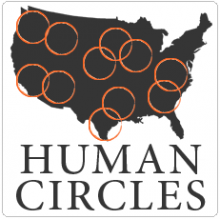
The New York City Human Circle will be replicated throughout across the nation, when faith leaders host Human Circles as members of the Sojourners National Mobilizing Circle, which is bringing together faith and community leaders to organize faith-rooted actions in their communities.
The purpose of these circles is not only to lobby for the poor but also with them.
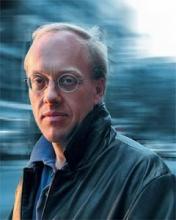
Chris Hedges' statement on Occupy Wall Street read in part:
As part of the political theater that has come to replace the legislative and judicial process, the Securities and Exchange Commission agreed to a $550 million settlement whereby Goldman Sachs admitted it showed "incomplete" information in marketing materials and that it was a "mistake" to not disclose the nature of its portfolio selection committee. This fine was a payoff to the SEC by Goldman Sachs of about four days' worth of revenue, and in return they avoided going to court. CEO Lloyd Blankfein apparently not only lied to clients, but to the subcommittee itself on April 27, 2010, when he told lawmakers: "We didn't have a massive short against the housing market, and we certainly did not bet against our clients." Yet, they did.
I considered the passage of the Affordable Care Act as an indication of human moral evolution. For the first time in its history, the United States was going to set down a marker on health care and join the nations of the world that consider it a right not a privilege.
Now, those opposed to the law are in the process of taking it apart piece by piece through lawsuits in federal court and in a ballot initiative in Ohio next Tuesday.
Issue three in the Ohio ballot would allow the people of Ohio to opt out of the individual mandate to purchase health insurance in the Affordable Care Act. If this initiative passes, it would be unfortunate for the people of Ohio.
Occupy Wall Sreet, false idols and a moral economy. Breaking the cycle of poverty. Poorest poor in U.S. hits a new record: 1 in 15 people. As poverty deepens, giving to the poor declines. Arianna Huffington: Shakespeare, the Bible and America's shift into a punitive society. Peaceful Occupy Oakland march followed by late-night clashes.
This morning, as I caught up on what had been going on in the world over the weekend, I stumbled across a very interesting resource -- a website that compares the frequency with which words appear in the Bible and the Quran.
Although that in itself is an interesting tool, I was less interested in the comparison feature and more interested to see how often certain words appear in the Bible.